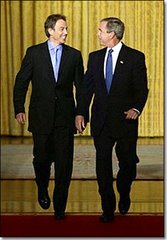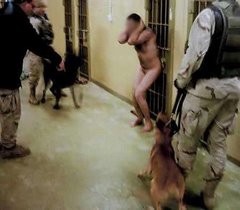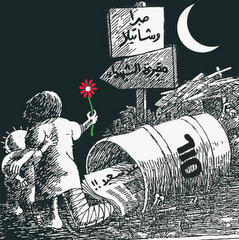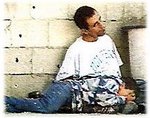For the Zionists the Palestinian Christians represent an obstacle to their plan to create a Jewish State in Palestine that would be 100% Jewish.
In 1948, the Zionists expelled from Palestine 100,000 Christians. During the 1948 war, Zionists destroyed desecrated and profaned Christian churches, convents and institutions throughout the Occupied area of Palestine.
During the June the June war of 1967 Israeli forces shelled and damaged many churches in the old city of Jerusalem and the Church of the Nativity in Bethlehem.
Israeli forces opened the Church of the Holy Sepulchre to Jews who poured into the holiest place in Christendom indecently dressed behaving disrespectfully joking, singing and pouring pharisaic hate and insults against Christianity and against Jesus Christ inside the Holy Sepulchre and next to the tomb of Jesus Christ.
Israeli Authorities censor all films and plays to prevent mentioning the name of Jesus Christ.
The Zionist reflected with their action the deep-felt hatred of everything Christian embedded in the Zionist ideology. Testimony shows that this hatred went so deep that the Zionist authorities removed the international “+” sign from mathematics textbooks because of the resemblance of the plus sign to the Christian Cross.
Destruction of a Christian Site on Mount Abu Ghniem
Occupied Jerusalem- Palestinian archaeologists said on Sunday that Israeli bulldozers destroyed the ruins of an important Christian church on mount Abu Ghniem known as Al-Istiraha (resting place) church constructed in the fifth century on the road from Jerusalem to Bethlehem.
The Palestinian archaeological department issued a report on the dangers of constructing a Jewish settlement on mount Abu Ghniem since it threatens archaeological and historical sites in the area.
The report contained an account of the archaeological sites on Abu Ghniem, indicating that this hill is a religious site where there is a water well that is known Al-Istiraha and was later named Virgin Mary’s well. It is situated 500 meters away from Mar Elias monastery on the road to Jerusalem, and filled with rainfall water. Historic findings indicate that the well was dug 3000 years ago like many other wells of this commercial road. The Israeli occupation authorities closed the well with concrete in 1968-1970 and switched the water to the illegal Jewish settlement of Gilo. According to some religious accounts, Virgin Mary and Joseph rested near the well when they were on their way to Bethlehem when the Virgin was feeling tired from the pregnancy. Another legend says that the Wise Men on their way to see the new born Jesus in Bethlehem rested near the well, where they saw the star again which led them to the place of Jesus. A third legend says that this well was suddenly discovered with an explosion so virgin Mary can drink while she passed from the area and the well was therefore named Virgin Mary’s well.
According to the report, there are many other religious sites in the area; for example, there are the ruins of a church that has a large ground of mosaics.
Another place is the Seir Al-Qalam, a traditional location for the Shepherds Field in Bethlehem, and Mar Elias Monastery that was maintained by the Byzantine Emperor Manuel Komeinous in the twelfth century A.D. This is in addition to the Al-Istiraha church ( Resting place) constructed in the fifth century to revive the memory of the Holy Family resting in this occupied Palestinian spot.
In reality, the Christian Holy Places were targeted by the Zionists as early as 1948.
During the Palestine war of 1948-49, Zionist forces desecrated, profaned, destroyed and looted Christian Holy Places in Palestine.
On May 31, 1948, the Committee of the Christian Union of Palestine issued an important statement in Jerusalem denouncing the raids mounted by the Zionist gangs against the Christian Holy Places of Palestine.
The statement said, “…The Jews took advantage of this opportunity [the cease fire for eight days on May 14, 1948] and immediately occupied the main strategical points from where they tried to attack the Arabs and to launch their attack on the Holy city. We immediately informed the Consular committee of Armistice and the representative of the International Red Cross of this infringement of agreement by the Jews. The reply received was that the Jewish Agency declared that the Stern Gang, which is working separately, broke the ceasefire agreement and that the Jewish Agency had no control over this group. We then realized that the terrorists are controlling the Jewish movement…”
The statement enumerated some of the damage sustained by the Christian Convents and Institutions at the hands of the Zionists.
During the June war of 1967 Israeli forces shelled and damaged many churches in the old city of Jerusalem and the church of Nativity in Bethlehem. Israeli forces opened the church of the Holy Sepulchre to Jews who poured into the holiest place in Christendom indecently dressed, behaving disrespectfully, joking singing and pouring pharisaic hate and insults against Christianity and against Jesus Christ inside the Holy Sepulchre and next to the tomb of Jesus Christ.
posted by www.jerusalemites.org
Friday, August 15, 2008
The Russian empire strikes back

By Adi Schwartz, Haaretz Correspondent
http://www.haaretz.com/hasen/spages/1011861.html
Tags: Georgia, Russia
Exactly 40 years ago, on a hot August day in 1968, Alexander Dubcek stood looking out his office window as thousands of Soviet soldiers poured into his city, Prague. The First Secretary of the Communist Party of Czechoslovakia and the architect of the "Prague Spring" knew it was only a matter of time until he heard a knock on the door.
In his memoir, "Hope Dies Last," Dubcek wrote, "The main door flew open again, and in walked some higher officers of the KGB, including a highly decorated, very short colonel. The little colonel quickly reeled off a list of all Czechoslovak Communist Party officials present and told us that he was taking us 'under his protection.' Indeed we were protected, sitting around that table - each of us had a tommy gun pointed at the back of his head."
Two days later, Dubcek was taken to the Kremlin, where then Soviet president Leonid Brezhnev explained the prevailing reality to him and cut short the democratic reforms by thumping his fist on the table. Dubcek was sent back to his country, where he spent the next 20 years as a forester in a remote region of Slovakia.
Advertisement
At least for now, Georgian President Mikheil Saakashvili is being spared that fate. He is still the ruler of the small Caucasian state. The outcome of this week's events, however, could prove quite similar to the drama of 40 years ago. The Soviet oppression of Czechoslovakia showed the whole world that the U.S.S.R. would not tolerate democratic adventures within its sphere of influence. The Soviet Union made it clear to Eastern Europe that the West, including the United States, would not lift a finger as Soviet tanks crushed a small sovereign state. The defeat of the Prague Spring truncated a wave of openness and democratization that had washed over both Eastern and Western Europe in the late 1960s.
The two decades that have passed since the fall of the Iron Curtain can now be divided in two. The first 10 years, dubbed the "end of history" by U.S. political philosopher Francis Fukuyama, lasted from 1989 until September 11, 2001, and were characterized by unflappable optimism. The cold war made way for globalization. The Western model trumped all available alternatives. The U.S. became the world's sole superpower, with unchallenged military, diplomatic and economic hegemony. China was taking baby steps toward a free-market economy and Russia was getting its first tastes of democracy.
Then came the terror attack against New York's World Trade Center. Suddenly it turned out that not everyone wanted to join the McDonald's and laptop festivals. The failed U.S. wars in Afghanistan and Iraq caused a deep rift in the Western camp. Russia, which felt severely humiliated over the loss of Eastern Europe and the 15 republics that had made up the Soviet Union, switched gears. Under the scepter of former KGB officer Vladimir Putin, Russia reverted to tricks that were thought forgotten, such as poisoning the Ukrainian president or eliminating journalists and potential political rivals. Instead of human rights, a free-market economy and democracy, we got nationalizations, the imprisoning of rebellious oligarchs and tight supervision of the press.
'History is returning'
This week's events in Georgia are the most obvious manifestation of that shift. On Wednesday, U.S. Secretary of State Condoleezza Rice said, with inelegant tardiness, that Washington will not allow Georgia to fall, as it did with Czechoslovakia in 1968. President George W. Bush, for his part, promised humanitarian aid and even delayed his vacation "for a day or two, at least," but for now the American response looks hesitant and anemic.
For the first time in 30 years, Russia has initiated a war beyond its borders. For the first time in 20 years, an elected democratic regime is being threatened by force. For the first time in 20 years, the West is standing exposed and helpless, with its stock exchanges, galloping euro, flourishing economy and highfalutin talk of human rights. The planes and tanks in Georgia have returned to Russia its status of superpower.
In a twist on Fukuyama's "end of history" hypothesis, former Israeli ambassador to Washington Itamar Rabinovich asserted that this week it seemed as though "history is returning in a big way, and America has to cope with a new reality." According to Rabinovich, "The Russians' power play succeeded and is likely to have a great many implications."
The most immediate change will be felt in the Caucasus, a region of utmost strategic and economic importance for both Russia and the West. Dr. Brenda Shaffer, an expert on the Caucasus from Haifa University, explains that the region's natural gas reserves are even more important than its oil. "It is too late to be talking about oil as a global weapon," she says. "In Israel and around the world people still think in terms of the energy crisis of the 1970s, but oil is a fluid that can be transported relatively easily. Oil can be purchased from Russia today, from Norway tomorrow and from Saudi Arabia next week. Gas, on the other hand, must be supplied via pipelines that cost billions of dollars to build. Gas pipelines must pass through several countries and are extremely dependent on local political conditions."
Shaffer notes that in the past few years, European countries have been trying to develop direct supply lines from Central Asian states holding large natural gas reserves. Europe's growing dependency on Russian oil and gas spurred the continent's efforts to find alternatives, which is irritating Russia. "Natural gas, which the Europeans find very attractive because it is more environmentally friendly than oil, has so far traveled from Central Asia to Europe only via Russia," continues Shaffer. "Of course oil also has its problems: The fact that a Sukhoi SU-25 fighter jet 'almost' hit the oil pipeline running from the Caspian Sea to the Mediterranean Sea is interesting. The SU-25 is a very sophisticated plane that could easily have bombed the pipeline. Indeed, this doesn't seem like a miss but more like a message to the West: Don't mess with us."
This means that Europe is becoming increasingly dependent on Russia for energy. "Massive projects have been planned in recent years," says Shaffer, "such as the Nabucco Pipeline, to bring Central Asia's natural gas by way of the Caspian Sea and Georgia to the Mediterranean. We can forget about that project now. Russia has made that very clear. Russia did not invade Kazakhstan, but rather a small country that is a bottleneck between Central Asia and the West. No one will want to take the risk of angering the Russians again."
Beginnings of a new world order?
But Russia's message is not merely economic. "Several regimes in this region are wondering about where they are headed," says Shaffer. "America's blatant abandonment of its best friend in the region, President Saakashvili, will certainly prompt a policy reevaluation in countries like Azerbaijan, Kazakhstan and Turkmenistan. If until now these states were certain that it was in their best interest to befriend the Americans - and we saw how they responded to the war in Afghanistan - now they may think it more worthwhile to befriend Iran or Russia. Maybe these two states can protect them where the Americans have failed. From the point of view of U.S. foreign policy, this conclusion has very negative repercussions. The Russian invasion of Georgia exposed the Europeans and Americans' bluff, and left the Georgians on their own. I would even go so far as to say that maybe the presidents of Afghanistan and Iraq are already considering their next steps." This week's unprecedented support for Saakashvili by the presidents of Poland, Ukraine, Lithuania and Estonia indicates that the picture extends beyond the Caucasus. Alexander Rahr, a member of Germany's Council on Foreign Relations and author of a biography of Vladimir Putin, believes this marks the beginning of a new world order. "Bush's legacy is a foreign policy disaster," says Rahr. "The dream of democratizing the Middle East has been shattered. As his final months in office approached, he was at least trying to bring Ukraine and Georgia closer to NATO, and now that won't happen. He tried to install missiles in the Czech Republic and in Poland, and that won't happen either. It turns out that American influence has its limits, and that Russia has regained a sphere of influence. This is no longer the Russia of the 1990s, beaten and bruised, unable to act on behalf of its own interests. Russia is now in a position to respond, and that is exactly what it did.
"A very similar crisis could develop in the Crimean peninsula, which now belongs to Ukraine, but used to belong to Russia, and has a large Russian population. Now everyone realizes that the Russians are serious. The same thing could also happen in Azerbaijan. Public opinion in those countries could change - from pro-Western to not wanting to rankle the Russian neighbor." Rahr also feels this week's events could affect a possible military campaign against Iran, too. "America's space for maneuver has shrunk," he says, "both strategically and logistically. Now it will be much harder for America to operate in Russia's southern part. Diplomatically, too, Russia's voice will increasingly be heard."
Twilight of U.S. hegemony
The roaring of the Russian artillery near Tbilisi, which clearly revealed that the issue was not South Ossetia but rather Russia's status in the world, also prompted a reevaluation by Sovietologists and Russian historians.
"This is without a doubt a founding moment," says Anne Applebaum, a historian and author of the international best-seller "Gulag: A History." "This week the Russians set an example. Just like when they killed journalist Anna Politkovskaya. There is no need to kill all the country's journalists. One is enough, and all the rest get the message. That's what [Russia] did this week: There is no need to invade all the countries in the region, but they will all get the message.
"In recent years we have seen a deterioration in the human rights situation in Russia," Applebaum continues. "Now it is clear that rising Russian nationalism will extend beyond the country's borders. This week's events also made it clear that the belief that only the U.S. can flex its muscles is mistaken. They marked the end of an era in which the U.S. behaved like the only superpower. It was interesting to follow the events on a split-screen television, showing both the amazing spectacle China organized for the opening of the Olympic Games and pictures from Georgia. We saw two new superpowers, evincing different behavior, of course, but which completely undermine America's global hegemony. We saw history in the making, right before our eyes."
Historian Simon Sebag-Montefiore, author of two biographies of Josef Stalin, believes this is "the start of the twilight of America's sole world hegemony.
"The retaking of Ossetia is a minor part of the Russian campaign," says Montefiore, who has visited Georgia many times and is personally acquainted with the three presidents who have headed the country since the Soviet Union's disintegration. "More significant is the attack on Georgia proper, which reasserts Russia's hegemony over the Caucasus and defies American superpowerdom.
"The prospect of encirclement by triumphant America infuriated Russia," he continues. "Imagine if newly independent Wales joined the Warsaw Pact. This war is really a celebration of ferocious force in the realm of international power, a dangerous precedent. Russia has demonstrated the limits of U.S. power and Moscow's historic destiny as regional and world superpower. The Empire has struck back and shaken the order of the world."
Israel and the US behind the Georgian aggression?

There is an obvious Israeli involvement in the present conflict between Georgia and Russia. There are hundreds of Israeli military advisers in Georgia and this is not just the claim of the rather unreliable DebkaFile but also the more respected Ha'aretz expert Yossi Melman, the daily Ma'ariv and also the rather reliable website "News First Class" (NFC).
Melman wrote on 25.6.2008 that Georgia became a real El Dorado for Israeli arms dealers and numerous representatives of the army and intelligence services. Some former generals like Israel Ziv and Gal Hirsh (with his company Defensive Shield) are very active there.
"Gal Hirsh and Israel Ziv are mainly training and consulting Georgian arm units. They are using the "chain" method common among Israeli arm dealers: a main contractor wins a tender and employs then sub-contractors – in this case Israeli officers and former Shin Beth employees," wrote Melman.
According to him there was a project to sell Merkava tanks to Georgia, but allegedly the Israeli foreign ministry prevented the deal and a policy was outlined that only defensive weapons are allowed to be sold.
Just the same Russia protested agains the Israeli military support to Georgia after an Israeli produced UAV was shot down. On August 5 Israel reiterated its official policy that it allegedly sells only defensive and not offensive weapon systems to Georgia. This is the version published e.g. in the Jerusalem Post; other sources, like the Israeli daily Ma'ariv on 8.8, claim that Israel decided to stop altogether the military support to Georgia. Just the same Ma’ariv points out that the Georgian defense minister, David Kezerashvili, lived for a while in Israel and speaks Hebrew. In a lengthy article the military exports to Georgia are described. Ma’ariv estimates them to be of a value of at least USD 300 million. An Israeli marketing expert told Ma'ariv: "To every Israeli agent representing an Israeli defense company is attached a cousin of the defense minister, who opens the doors for him."
Also NFC confirms the massive presence of Israeli advisers in Georgia and writes: "The Israeli military industries upgraded in recent years the Georgian air force, sold unmanned aerial vehicles (UAV), advanced artillery systems and trained infantry units." (9.8) The NFC claims that according to sources in Washington in Moscow the war started because Georgia wants to reverse Israel’s decision and achieve the continuation of the support. Israel, according to NFC, conceded to the Russian threatening that it would otherwise go through with the sale of its most advanced anti-aircraft missile system S-300 to Iran and Syria.
Actually the opposite conclusion is also possible, namely that Israel wants to pressure Russia not to sell the S-300 and stop its support to Iran.
The Israeli website DebkaFile, that is known to publish mainly conspiracy theories, believes that up to 1,000 Israeli advisors are active in planning and implementing the present Georgian military action (8.8). This conclusion sounds plausible.
Actually it has to be taken into consideration that also U.S. "consultants" are helping the Georgian army, as according to Pentagon spokesman Bryan Whitman, there are 127 U.S. military trainers there, of whom about 35 are civilian contractors.
In addition to the trainers, 1,000 soldiers from the Vicenza, Italy-based Southern European Task Force (Airborne) and the Kaiserslautern-based 21st Theater Sustainment Command, along with Marine reservists with the 3rd Battalion, 25th Marines out of Ohio, and the state of Georgia’s Army National Guard’s 1st Battalion, 121st Infantry participated in "Immediate Response 2008."
Operation Immediate Response 2008 was held from July 15-July 30, with U.S. personnel training about 600 troops at a former Soviet base near Tbilisi, the largest city and capital of Georgia. The goal of this operation was allegedly teaching combat skills for missions in Iraq. The Marines left already the country, but not the airmen.
It is obvious that there are numerous Israeli and U.S. interests in Georgia and it is highly likely that they are behind the dangerous Georgian move.
Posted by uruknet.info
:: Article nr. 46326 sent on 10-aug-2008 12:31 ECT
www.uruknet.info?p=46326
Subscribe to:
Comments (Atom)












